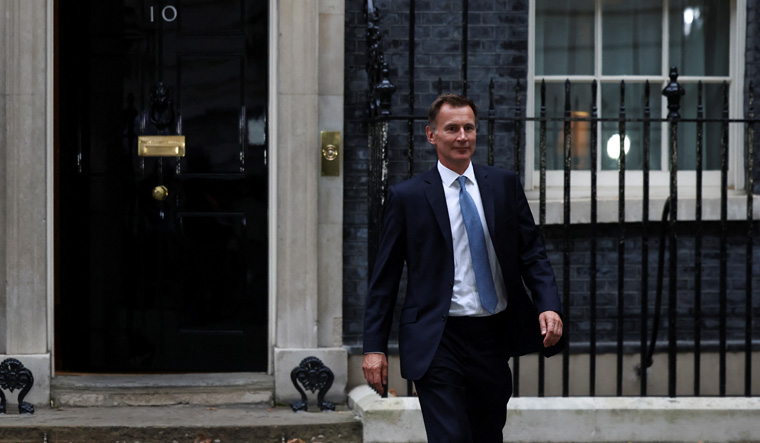Britain's Treasury chief says he's increasing the windfall tax on the profits of oil and natural gas companies as he announced an emergency budget aimed at restoring the nation's economic credibility and patching up its battered finances.
Jeremy Hunt said Thursday that the windfall tax will rise from 25 per cent to 35 per cent from January 2024 to March 2028 and that electricity generators will have to pay a new temporary levy of 45 per cent.
He said the taxes combined would raise 14 billion pounds next year.
Energy companies such as London-based BP and Shell have reported huge profits in recent months as Russia's war in Ukraine pushes up energy prices worldwide.
Britain's government has faced pressure to increase taxes on oil and gas companies to help fund support for millions of Britons struggling to cope with soaring energy prices.
Prime Minister Rishi Sunak, a former Treasury chief, introduced a 25 per cent energy profits levy earlier this year but that was limited to profits made from extracting UK oil and gas.
Hunt is unveiling tax increases and spending cuts in a speech to the House of Commons in a bid to tame double-digit inflation and rein in a growing deficit. He says the budget will tackle the cost-of-living crisis and rebuild our economy.
Just three weeks after taking office, Prime Minister Rishi Sunak's government faces the challenge of balancing the nation's budget while helping millions of people slammed by a cost-of-living crisis as Russia's war in Ukraine pushes up energy prices and slows economic growth.
“Today's statement will help deliver the long-term stability this country needs,” Sunak promised in a promotional video released ahead of the statement.
Hunt expected to announce 30 billion pounds ($36 billion) in spending cuts and 24 billion pounds in tax increases, British media reported.
He is likely to announce an expansion of a tax on the windfall profits of energy companies to help consumers grappling with higher natural gas and electricity bills.
The government also may delay plans to raise the thresholds for higher income tax brackets.
That would increase revenue from individual taxpayers as their pay brackets rise with inflation.
The emergency budget statement aims to restore the government's financial and political credibility after former Prime Minister Liz Truss announced 45 billion pounds ($53 billion) in unfunded tax cuts that torpedoed investor confidence, sent the pound to record lows against the U.S. dollar and sparked emergency central bank intervention. Truss was forced to resign six weeks after taking office.
“The government will struggle to meet all of the competing demands,” said Torsten Bell, chief executive of the Resolution Foundation, a think tank that seeks to improve the living standards of low-and middle-income people.
The uncomfortable reality is that unless global energy price rises reverse, we will remain poorer as a country than we'd hoped to be, Bell wrote this week. The world is as it is, not as we would like it to be, but the question is how well we wrestle with that reality.
That means grappling with the demands of nurses, police officers, border guards and civil servants who are all clamouring for pay increases after inflation accelerated to a 41-year high of 11.1 per cent in October.
Welfare recipients and pensioners also are looking for higher payments, and low-income families are calling for an expansion of the free school lunch programme.
But resources are limited, with Sunak facing a budget shortfall of at least 40 billion pounds ($47 billion).
Hunt will reiterate his commitment to fairness as the government balances its books, ensuring support for the most vulnerable and seeing that those with the broadest shoulders bear the heaviest load, the Treasury said in a statement.
The budget comes against a grim backdrop, with the war in Ukraine, aftershocks from the COVID-19 pandemic and the economic strains of Britain's exit from the European Union all weighing on the UK economy.
Economic output shrank by 0.2 per cent in the third quarter, and the Bank of England predicted a recession that could last as long as two years.
The government also is paying the price for the unfunded tax cuts announced by Truss, which damaged Britain's reputation for financial discipline and boosted government borrowing costs.
Hunt and Sunak, who replaced Truss as Conservative Party leader and prime minister last month, have reversed most of Truss' policies while pledging that the government will pay its bills and start reducing debts built up over the past 15 years.
UK public debt ballooned to almost 83 per cent of economic output in 2017 from less than 36 per cent in 2007 as the government bailed out banks and struggled to bolster the economy.
A decade of budget tightening had started to reduce the burden when the COVID-19 pandemic and war in Ukraine pushed debt to 98 per cent of gross domestic product. That is the highest since 1963, when Britain was still recovering from World War II.



